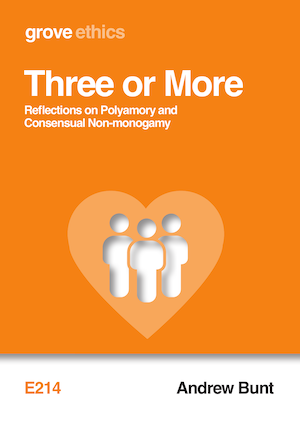This week is Week of Visibility for Non-Monogamy, an international initiative celebrating and promoting polyamory and consensual non-monogamy. Polyamory and consensual non-monogamy are terms used to describe the practice of romantic and sexual relationships of three or more people and are fast growing in acceptance and practice in the modern west. The Week of Visibility is a reminder that Christians need to start thinking about this next frontier in sexual ethics.
Last year I published Three or More: Reflections on Polyamory and Consensual Non-monogamy, a short book designed to help start the Christian conversation on these topics. Here’s an extract to whet your appetite. You can buy the book (in paperback or eBook format) at Grove Books.
A Christian Response
How should Christians respond to the increasing acceptance and practice of polyamory and consensual non-monogamy (CNM)? This will be a key question in coming years. I offer a few initial reflections.
 Cultivate the right heart posture
Cultivate the right heart posture
Any Christian response must start by considering our own hearts such that we reflect not only God’s truth but also his heart.
Gospel humility. The gospel shows us that we are all equal before God. All of us experience desires that go against God’s will. All of us sin – in thought, word, and deed. Therefore, even if polyamory or CNM is not something we have ever practised or even contemplated, we have no right to be self-righteous.
We must also remember that all people are made in the image of God and are deserving of honour and respect. There is no place for hatred or mistreatment of polyamorous people by or among Christians. We must imitate Jesus in drawing near to and welcoming all people.
Gospel hope. The sexual revolution has produced many casualties. Sadly, we can expect polyamory and CNM to create further casualties. But we should not be left in despair as we look around at society. Rather, we can be filled with hope knowing that God has good news for us and for society when it comes to human relationships and that the gospel is God’s power to save those who have been caught in the crossfire of the revolution.
Live out God’s plan
It is vital that we embrace in full God’s plan for human relationships and that we live this out before the world. We must show and not just share God’s plan with the world.
We must show and not just share God’s plan with the world.
A big part of this will be prioritising friendship. The decline of friendship and the unrealistic expectations placed on monogamous relationships are contributing to the growing popularity of polyamory. People are turning to polyamory in search of the fulfilment of legitimate needs that Scripture indicates can be met in friendship. We need to live out Jesus’s call to friendship that is characterised by self-sacrificial love, honesty, and commitment.
We also need to live out God’s plan for marriage, sex, and singleness. We can challenge the cultural misunderstandings about these elements of human experience by putting on display God’s better plan. We can demonstrate that marriage is about self-sacrifice, not just personal fulfilment, that marriage is not the single relationship that can completely fulfil us, that sex and romance are not the pinnacle of life, and that celibate singleness doesn’t have to mean loneliness and isolation.
Living out the fullness of God’s plan for human relationships will allow us to witness to the world around us that what God says is good and is for our good. We can show that God has a better plan and a better answer for the longings that are driving the increasing prominence of polyamory and CNM in modern western society.
Talk about God’s plan
We also need to learn to talk well about God’s plan.
This talking must take place in the Church. We must teach Christians the fullness of God’s plan for human relationships, teaching not just the what but also the why. Many Christians have only a surface understanding of biblical teaching on human relationships such that when something comes along to challenge it – for example, they befriend the lovely polyamorous throuple next door – their convictions are shaken because they don’t understand why God says what he says. Christians need deep understandings of what God says, why he says it, and why it is good news for everyone. This will enable us to trust in and live out what God says in a culture that is moving increasingly far away from God’s plan.
We need to be ready not just to state what we believe but to explain why we believe it and how it is good news.
Talking about God’s plan also needs to take place beyond the Church. Christians need to learn how to confidently communicate the goodness of God’s plan to those around us. We need to be ready not just to state what we believe but to explain why we believe it and how it is good news. Christians need to be equipped to show people that God’s plan offers the best way for our legitimate needs for love, connection, and commitment to be met. We need to listen well to understand people’s longings and priorities so that we can then show how God’s ways best meet those longings and priorities.
Prepare for pastoral questions
In the coming years, the Church will have to think through appropriate responses to various pastoral questions that the practice of polyamory will raise. These questions must be approached with full commitment to the truth and goodness of God’s word and with equally full commitment to grace, humility, and love.
For those in polyamorous relationships, as for us all, responding to Christ will require radical repentance in both thinking and living. Christian faithfulness will require an acknowledgement of God’s plan for human relationships and of the sinfulness of alternative relationship setups. Faithfulness will also require the ending of relationships that fall outside of God’s will. For some, turning to Christ will be very costly and, as for many of us, repentance may be a journey over time rather than something that is enacted in full at conversion.
Polyamory may raise complex pastoral questions in the years to come. But God has given us his word and the guidance of his Spirit to help us respond in ways that both honour him and love people well.
Conclusion
Polyamory and consensual non-monogamy are already realities in modern western society. They are the next step in the radical transformation that has been permeating society since the start of the sexual revolution in the mid-20th century. But like many elements of that revolution, polyamory and consensual non-monogamy fall short of our creator God’s good plan for human relationships and human flourishing.
Against this backdrop, Christians have an opportunity. We have the opportunity to show and declare to our culture a better way of doing human relationships, the way that is both right and good. And equipped with the gospel, we can bring this good news to those around us not with judgement and harsh treatment but with love and humility. May we be those who bring such good news to the world around us.
This post is an adapted extract from Three or More: Reflections on Polyamory and Non-mongamy (Grove Books, 2024). The booklet can be purchased here.





